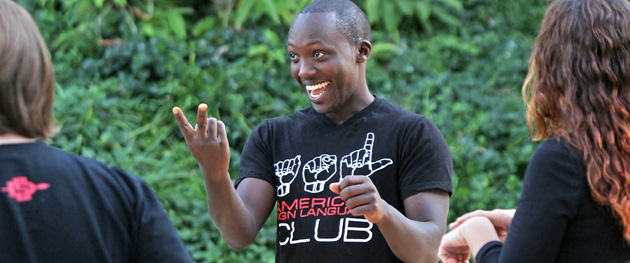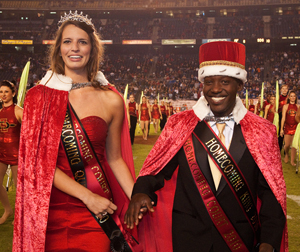A Global Language
SDSU's homecoming king is a champion and a role model for deaf students.

Isidore Niyongabo was 15 when he vowed to one day leave his native Burundi for America.
There were many reasons for his decision, but chief among them was defiance—an “I’ll show them” attitude—directed toward the authorities whose restrictions stood between him and his ambition to change the world.
No matter that Niyongabo had graduated at the top of his high school class. He is deaf from a childhood bout of meningitis; and no university in Burundi would admit him.
“That made me fighting mad,” he said.
A star in the night sky
A slender man with an easy smile, Niyongabo does not appear easily riled, but his resolve is as hard as the lustrous cobalt mined in Burundi. He left his native country so that he could eventually return with the academic and research credentials to help deaf children get the emotional support they need while developing language skills equal to those of their hearing counterparts.
Niyongabo came to the U.S. with an international student visa in 2005. He entered a Catholic religious order, but eventually decided that psychology, not the priesthood, was his calling. At Ohlone College in Fremont, Calif., he completed an associate’s degree while working to raise the profile of the American Sign Language Club. In fall 2009, he transferred to SDSU as a psychology major with a minor in human biology.
“The first time I came to campus, I was alone and it was a dark night,” Niyongabo recalled. “I happened to meet someone who knew a little signing, and it was like a small star in the night sky. And that star kept expanding until the entire night sky was illuminated for me.”
Keeping the culture alive
At SDSU, Niyongabo met several students who could sign and others who were learning through an ASL program in the College of Health and Human Studies. When budget cuts forced the college to suspend its program, Niyongabo helped create an ASL Club for students to continue learning outside the classroom. They meet near the turtle pond at Scripps Cottage so passersby can see them using sign language to communicate.
Niyongabo also mobilized the club to raise awareness of the need for professionals with signing skills. They sold t-shirts saying SDSU for ASL, ASL for SDSU and raised $700 to support the ASL Club. Through an interpreter, Niyongabo spoke at a meeting of Associated Students. He appealed to the board to approve a resolution urging a “temporary,” rather than an “indefinite” suspension of ASL classes.
“I said that we want to keep ASL classes for all students. We need students who can transfer ASL skills to the community—to doctors, nurses and educators. Sign language allows us to go anywhere in the world and if you take that away from us, you are separating the hearing world from the deaf world. It’s important for us to keep the culture alive on campus until the program can come back again.”
A chance to give back

Last fall, the ASL Club nominated Niyongabo to the SDSU Homecoming Court. Competing against 25 fellow nominees, he made the first cut and was eventually chosen Homecoming King opposite Homecoming Queen Sadie Eisley, the SDSU Mortar Board nominee.
For their service project, Niyongabo and Eisley will ask SDSU student organizations to assemble gift baskets for deaf and foster youth under the care of the Polinsky Children’s Center, San Diego Youth Services and local high schools. They will invite the youth to campus on May 6 for a college leadership workshop with SDSU student leaders and staff of the Educational Opportunity Program. With any remaining funds, Niyongabo and Eisley hope to create a scholarship for a deaf and foster youth.
The chance to give back is especially sweet for Niyongabo, who has been the recipient of others’ generosity. If not for that and his fierce determination, he might still be in the Burundi refugee camp where his mother and siblings have lived for 17 years.
Asked what he wants people to know about him, Niyongabo said this:
“Tell them about a boy who was born into a poor family and a life that held little chance of success. His father passed when he was 11. The university in his own country wouldn’t accept him because he is deaf. He came to the U.S., went to school while working full time, and is now fulfilling his dream so that other people can reap the benefits of his life long after he is gone.”



